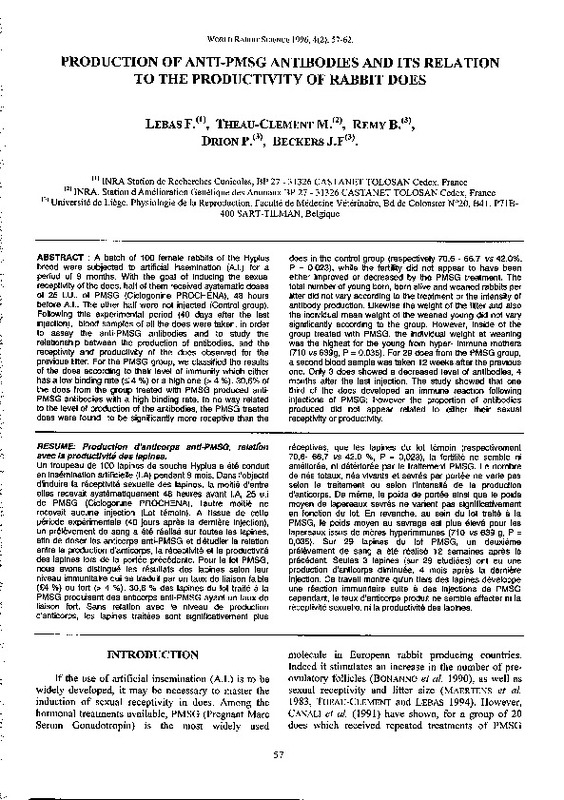JavaScript is disabled for your browser. Some features of this site may not work without it.
Buscar en RiuNet
Listar
Mi cuenta
Estadísticas
Ayuda RiuNet
Admin. UPV
PRODUCTION OF ANTI-PMSG ANTIBODIES AND ITS RELATION TO THE PRODUCTIVITY OF RABBIT DOES
Mostrar el registro sencillo del ítem
Ficheros en el ítem
| dc.contributor.author | Lebas, F.
|
|
| dc.contributor.author | Theau-Clement, M.
|
|
| dc.contributor.author | Remy, B.
|
|
| dc.contributor.author | Drion, P.
|
|
| dc.contributor.author | Beckers, J.F.
|
|
| dc.date.accessioned | 2011-03-21T12:11:47Z | |
| dc.date.available | 2011-03-21T12:11:47Z | |
| dc.date.issued | 1996 | |
| dc.identifier.issn | 1257-5011 | |
| dc.identifier.uri | http://hdl.handle.net/10251/10475 | |
| dc.description.abstract | [EN] A batch of 100 female rabbits of the Hyplus breed were subjected to artificial insemination (A.I.) for a period of 9 months. With the goal of inducing the sexual receptivity of the does, half of them received systematic doses of 25 1.U .. of PMSG (Ciclogonine PROCHENA), 48 hours before A.I.. The other half were not injected (Control group). Following this experimental period (40 days after the last injection), blood samples of all the does were taken, in order to assay the anti-PMSG antibodies and to study the relationship between the production of antibodies, and the receptivity and productivity of the does observad for the previous litter. For the PMSG group, we classified the results of the does according to their level of immunity which either has a low binding rate (::::; 4 %) ora high one (> 4 %). 30,6% of the does from the group treated with PMSG produced antiPMSG antibodies with a high binding rate. In no way related to the level of production of the antibodies, the PMSG treated does were found to be significantly more receptiva than the does in the control group (respectively 70.6 - 66.7 vs 42.0%, P = 0.023), while the fertility did not appear to have been either improved or decreased by the PMSG treatment. The total number of young born, born alive and weaned rabbits per litter did not vary according to the treatment or the intensity of antibody production. Likewise the weight of the litter and also the individual mean weight of the weaned young did not vary significantly according to the group. However, inside of the group treated with PMSG, the individual weight at weaning was the highest for the young from hyper- immune mothers (710 vs 639g, P = 0.035). For 29 does from the PMSG group, a second blood sample was taken 12 weeks after the previous one. Only 3 does showed a decreased level of antibodies, 4 months after the last injection. The study showed that one third of the does developed an immune reaction following injections of PMSG; however the proportion of antibodies produced did not appear related to either their sexual receptivity or productivity. | es_ES |
| dc.description.abstract | [FR] Un troupeau de 100 lapines de souche Hyplus a été conduit en insémination artificielle (l.A) pendant 9 mois. Dans l'objectif d'induire la réceptivité sexuelle des lapines, la moitié d'entre elles recevait systématiquement 48 heures avant 1.A, 25 u.i de PMSG (Ciclogonine PROCHENA), l'autre moitié ne recevait aucune injection (Lot témoin). A l'issue de cette période expérimentale (40 jours aprés la derniére injection), un prélévement de sang a été réalisé sur toutes les lapines, afín de doser les anticorps anti-PMSG et d'étudier la relation entre la production d'anticorps, la réceptivité et la productivité des lapines lors de la portée précédente. Pour le lot PMSG, nous avons distingué les résultats des lapines selon leur niveau immunitaire qui se traduit par un taux de liaison faible (f'4 %) ou fort (> 4 %). 30,6 % des lapines du lot traité a la PMSG produisent des anticorps anti-PMSG ayant un taux de liaison fort. Sans relation avec le niveau de production d'anticorps, les lapines traitées sont significativement plus réceptives, que les lapines du lot témoin (respectivement 70,6- 66,7 vs 42,0 %, P = 0,023), la fertilité ne semble ni améliorée, ni détériorée par le traitement PMSG. Le nombre de nés totaux, nés vivants et sevrés par portée ne varia pas selon le traitement ou selon l'intensité de la production d'anticorps. De mame, le poids de portée ainsi que le poids moyen de lapereaux sevrés ne varient pas significativement en fonction du lot. En revancha, au sein du lot traité a la PMSG, le poids moyen au sevrage est plus élevé pour les lapereaux issus de meres hyperimmunes (71 o vs 639 g, p = 0,035). Sur 29 lapines du lot PMSG, un deuxiéme prélévement de sang a été réalisé 12 semaines aprés le précédent. Seules 3 lapines (sur 29 étudiées) ont eu une production d'anticorps diminuée, 4 mois aprés la derniére injection. Ce travail montre qu'un tiers des lapines développe une réaction immunitaire suite a des injections de PMSG cependant, le taux d'anticorps produit ne semble affecter ni la réceptivité sexuelle, ni la productivité des lapines. | |
| dc.language | Inglés | es_ES |
| dc.publisher | World Rabbit Science. ICTA. UPV | es_ES |
| dc.relation.ispartof | World Rabbit Science | |
| dc.rights | Reserva de todos los derechos | es_ES |
| dc.title | PRODUCTION OF ANTI-PMSG ANTIBODIES AND ITS RELATION TO THE PRODUCTIVITY OF RABBIT DOES | es_ES |
| dc.type | Artículo | es_ES |
| dc.date.updated | 2011-03-21T11:13:42Z | |
| dc.identifier.doi | 10.4995/wrs.1996.271 | es_ES |
| dc.rights.accessRights | Abierto | es_ES |
| dc.description.bibliographicCitation | Lebas, F.; Theau-Clement, M.; Remy, B.; Drion, P.; Beckers, J. (1996). PRODUCTION OF ANTI-PMSG ANTIBODIES AND ITS RELATION TO THE PRODUCTIVITY OF RABBIT DOES. World Rabbit Science. 04(2). https://doi.org/10.4995/wrs.1996.271 | es_ES |
| dc.description.accrualMethod | SWORD | es_ES |
| dc.relation.publisherversion | https://doi.org/10.4995/wrs.1996.271 | es_ES |
| dc.description.volume | 04 | |
| dc.description.issue | 2 | |
| dc.identifier.eissn | 1989-8886 | es_ES |








